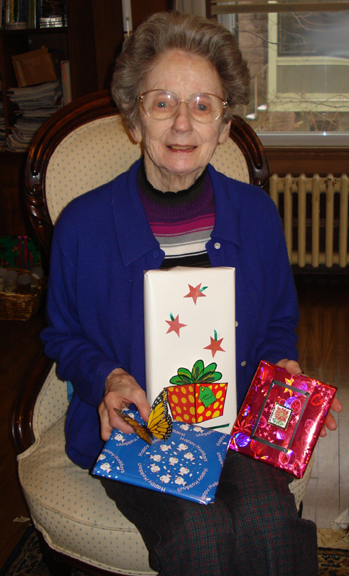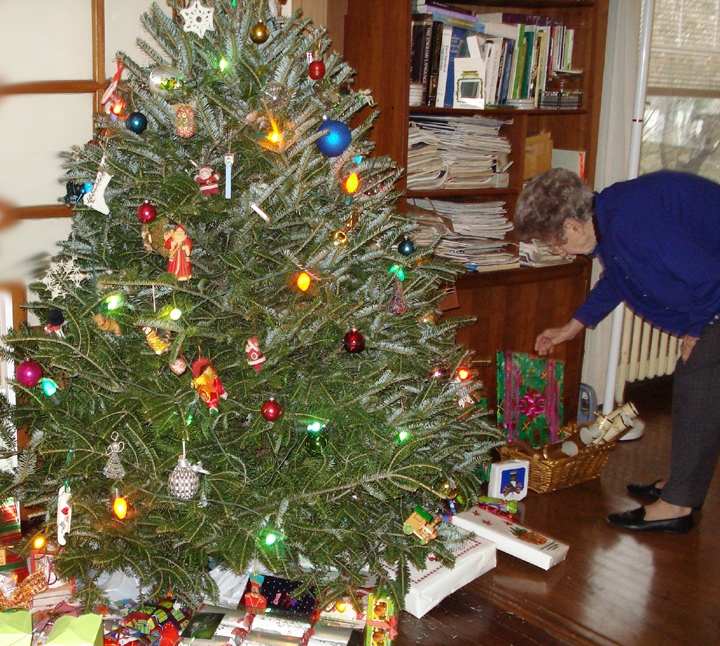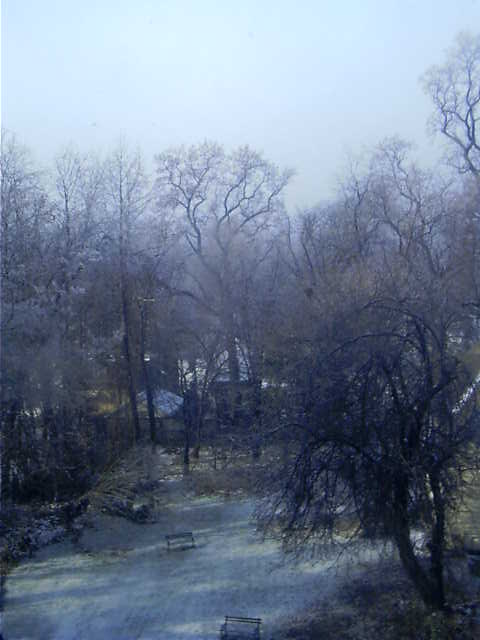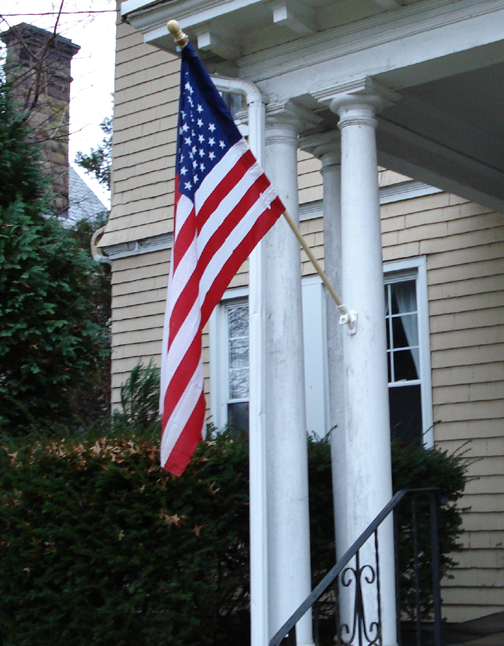December 28
My new toy: two pounds and it takes pictures:
A nice long walk in the windy, rainy-but-not-yet-raining sixties. Color is leached out, and it is dark enough in this Sunday mid-afternoon, for lights to be on in people's houses, and that wonderful transparency into windowed golden lives of other people. Families out for walks, kids on Daddy’s back, golden retrievers, boys with action figures on the floor of their porch.
Today’s Times Magazine has articles about people we lost this year, and I was especially touched by Mildred Loving, a long time widow and church woman in rural Virginia whose marriage to a white man back more than forty years became the suit that struck down miscegenation laws in the US. And especially touching, that she came out for gay marriage after long refusing interviews and public life at all.
Whether or not we want to live in public-- whether we hide from it, as she did, or want it, as I do, we are all about the same size.
At Ethical today: a discussion on health care, and I finally got straight the difference between socialized medicine (govt. owns hospitals, pays doctors– like the VA system) versus single payer (govt pays but money goes to various place: private or public). Duh.
Sunday, December 28, 2008
Warm and Rainy Sunday
Friday, December 26, 2008
Happy Holidays


December 26
‘Twas the day after Christmas, and gray in the sky,
Snow on the ground and hangovers from pie....
We spent two hours opening presents yesterday-- Joel insisting that each present be unwrapped and watched and enjoyed by all of us. This year, though, I had cleverly planned my cooking tasks so that I wasn’t anxious doing this: the ham was roasting and a bread was in the bread maker and the vegetables for roasting were already prepared.
I got my best Christmas present in years– the tiny Acer Aspire "netbook" computer . It is just 2 pounds and under $300 (barely under of course), and it is so cute ! I've wanted one of these subnotebooks for almost a year, since I started reading about them: solid state and with a Linux operating system. I wanted it for its true portability (I have a laptop but it's heavy and the battery has died). Anyhow this little job does email and word processing and is all I need for traveling.
Also for looking cool in Starbucks.
The keyboard is small, but I’d tried it at J&R and compared to my first “netbook” crush, an Asus eee (screen 7 inches diagonal), this one (screen 8.9) is downright roomy. Thinner and lighter than a hardcover book.
We had eight for Christmas dinner-- Mom, Andy and me, Sarah and Joel, and Howard and Alice and daughter Molly. A lot of cooking, and everyone helped (Joel and Sarah made some amazing garlic mashed with pre-roasted garlic) , ditto with clean-up. The work has already this morning faded into a general haze of warmth. Joel, Sarah, and Molly went to Sciainos’ after dinner, where Joel ate sausage and manicotti and cookies. Groan.
After Christmas dinner, we did Hanukkah candles, and no Christmas songs– but we were 3 to 1 Jewish to gentile. We tend to have Jews for Christmas and gentiles for Pesach. Seriously.
Monday, December 22, 2008
Yesterday started with snow and sleet, eventually lightened, and today is just deep cold, barely made double digits. There is that special short day pale orange light with the trees dark with brass highlights, the sky pale, shadows on snow. The speaker cancelled at Ethical yesterday, and we hung around awhile and then went and picked up mom at Prospect Presbyterian and went back to Prospect in late afternoon to hear their chancel choir do “The Messiah Part I.”
This was at Adrienne Bolden’s invitation, as she had the first alto solo, and she sounded tremendous, a long rounded sound to her voice, not low at all, but rich and muscular in a restrainted way. I had forgotten who all sings in their choir: solosalso by John Pearson and David Huemer and Ellie Winslow the librarian.
I always forget how much I like music, sitting and listening to it, watching singers and performers (small string group too, and their choir director played a harpsichord). I don’t like ambient music, but I like focusing on it, going where it is.
Much of the text of that part of “The Messiah” is from the Book of Isaiah.
Saturday, December 20, 2008
Books for Readers # 115
Meredith Sue Willis's
Books for Readers #115
December 20, 2008
It’s the season of the festivals of light-against-the-darkness, and I’ve got family arriving and lots to do, but most of my teaching is over for the present, which means I am beginning to do a little reading at my own whim. The last two months I’ve been reading mostly student work, which I enjoy, but it is, in the end, work. When I want to indulge myself, I read a nineteenth century novels. They are so big and long, and the sentences go on and on and the details pile up, and . I feel like I’m in front of an open fire nestled under a big feather comforter.
In this mood I just finished rereading George Eliot’s ADAM BEDE. It has been so long since I read it, that it is like a new book to me– albeit a book that I already knew by heart. It’s an odd sensation, to know a book in some deep way and yet to have forgotten most of the story. For example, the Young Squire, Arthur Donnithorne, whose wrongful relationship with Hetty Sorrel causes the main actions of the book, I remembered as heavyset, florid, and cloddish in his lack of feeling. In fact, he is light in build and light-hearted and altogether more sympathetic to me in this reading. I actually remembered him as having got off scot free from what he did, but in fact, his life is ruined and, perhaps more significantly, I had forgotten his part in an an essential plot point– his desperate off-stage race to try and save Hetty. I had even forgotten Hetty’s fate! I wonder if I’m more sympathetic to young men now that I have a son who is one. The good thing about forgetting important points like Hetty’s fate is the surprise the book still had for me.
This reading I also enjoyed more than in the past the slow chatty narrator’s discussios of rural life, and Aunt Poyser’s long speeches. This time I was not put off by Dinah’s final turn away from public preaching (the Methodist authorities had decided to forbid women preaching). I think in my original reading I had wanted her to rebel, but she is not a rebel, rather one of the ones who follow what they perceive to be God’s explicit directions. I had forgotten, rather unfairly, that handsome, heroic, but very conventional Adam Bede had been willing for her to continue preaching in public. I had remembered her as falling from proto-feminism into stupid Victorian wifehood, but she is thoroughly consistent.
What remains the same as I remembered, however, is the centrality of the women in the novel. The women act: they preach and argue and run away and cause many of the events in the novel. Even the mother of Adam and Seth Bede, who is a complaining sort of person, stimulates Adam to realize his feelings toward Dinah at the end. Mrs. Poyser does her work as a farm woman extremely well (and knows exactly what portion of the farm’s income is produced under her supervision). She speaks her mind with alacrity and a great deal of wit. And even Hetty Sorrel, for all of the superficiality of her personality, of her sensuality and total selfishness, is not only filled with the force of nature and an urge to live, but is also active although destructive in her crisis. That is the same from my first reading.
The power of the story seems stronger to me now: it is a well structured novel with a farmers’ harvest dinner balancing out the consdescending birthday party of the young squire given for the renters. As is true so often in George Eliot’s work, the great climax is not the end or perhaps even the most important part of the novel but rather a thing of which the consequences are the real point. So, has ADAM BEDE become one of my favorites again? It is a simpler story than MIDDLEMARCH, but I love it for its strength and energy.
Meanwhile, I’ve been continuing to read on religious topics, in particular, CHRISTIANITY: A VERY SHORT INTRODUCTION by Linda Woodhead. This is one of a series of small Oxford introductions, handy-dandy surveys that cover a lot fast and surprisingly well. This one was especially helpful to me with categories that explain or at least organize some of the extreme differences among varieties of Christianity. A couple of things I pulled out of it that struck me: Eastern Orthodox Christianity is less caught up in human sinfulness than the Roman Catholics and Protestants who follow Augustine more closely; that the area where Christians are in the twenty-first century increasing most in numbers is the “south”– Latin American and sub-Saharan Africa. In these new expressions of Chrisitianity there seems to be a lot of direct mystical experience. The other thing that was very helpful was the idea that you can roughly divide Christianity into categories based on how the believers make their connection with the divine. Woodhead distinguishes Church Christianity– the highly organized, priest-led type of church like, of course, the Roman Catholic Church, but also the Anglicans and the Presbyterians and anyone who puts emphasis on the dispensing of sacraments– and a second type that she calls Biblical Christianity, which puts faith in the believer’s direct apprehension of the Word, through the text of the Bible and preaching. A third variety is Mystical Christianity which takes its cues from inner feelings– direct intercourse with the spirit. Quakers would be an organized example of that. Clearly, of course, there have been mystics under the aegis of the Catholic Church and there are highly organized churches that started as Biblical, but it’s a nice way of thinking of things: how do the people have their experience of the divine? Through priests and sacraments? Through the Word preached and read? Through inner light?
I also read the lively anti-Christian monograph, Nietzsche’s THE ANTICHRIST (see below for Alex Kato-Willis’s take on this).
I want to end, however, with two short readings on religion and politics that come from a listserv of people who participated in the Columbia University sit-ins of 1968. Johnny Sundstrom posted this. He said, “I had the wonderful privilege of being adopted by an Arapaho-Lakota couple over thirty years ago. My Dad (Francis Brown] has gone on, but he left behind a wealth of knowledge and wisdom. I remember one time many, many years ago when he just looked at me for awhile and then said, ‘Indian people are all commonists.’ I looked back and then said, ‘Do you mean Communists?’ He said, ‘No, commonists. 'Communists' is a foreign word.. We believe in commonism.’ ‘OK,’ I said, ‘what's commonism?’ He smiled and said, ‘We all own the land, the air and the water and everything that comes from it. Nobody owns the land or the water or the air. That's commonism.’”
Johnny also tells a story about his Lakota Uncle Oliver Red Cloud (brother-in-law of Francis Brown). He once told Johnny that this life is “just practice". “I,” writes Johnny, “of course wanted to to know, ‘Practice for what?’ He replied, ‘Oh we don't know that.’ So, in my naivete, I pursued, ‘How do you know this?’ And he sat silent for awhile and then smiled and said, ‘Because nobody's very good at it.’” For another Francis Brown story told to Johnny Sundstrom and now to us, go to “The Banquet” .
E.M. FORSTER ON DICKENS AND H.G. WELLS
In ASPECTS OF THE NOVEL, E.M. Forster says of Charles Dickens and H.G. Wells: “They are, both, humorists and visualizers who get an effect by cataloguing details and whisking the page over irritably. They are generous-minded; they hate shams and enjoy being indignant about them; they are valuable social reformers; they have no notion of confining books to a library shelf. Sometimes the lively surface of their prose scratches like a cheap gramophone record, a certain poorness of quality appears, and the face of the author draws rather too near to that of the reader. In other words, neither of them has much taste: the world of beauty was largely closed to Dickens, and is entirely closed to Wells.”
MORE ON NIETZSCHE’S THE ANTI-CHRIST
Alexander Kato-Willis writes: “This is the book that affirms Nietzsche as the most profound of historical psychologists. His application of astounding historical knowledge to the analysis of the human mind is deeply moving. In regards to agreeing or disagreeing with his ideas, I believe that Nietzsche's work defies correctness or incorrectness. In the same way that a listener does not say whether a piece of music is correct or incorrect, Nietzsche's writing is art in thought form and is not productively approached from a desire to find unemotional truth.”
MORE BOOK RECOMMENDATIONS
Jeffrey Sokolow says, “I'm currently reading THE HAKAWATI [THE STORYTELLER], a novel by a Lebanese author, Rabih Alameddine. It's a bawdy and engrossing read that combines stories that could be out of the 1001 Nights and a family saga. Pick it up and you won't be able to put it down.”
GOOD NEWS
Phyllis Moore writes to say, “I read THE BALLAD OF TRENCHMOUTH TAGGART by M. Glenn Taylor (formerly of Huntington, West Virginia). It surely has an unusual plot. Trenchmouth is one of the strangest protagonist in West Virginia lit– it's sort of a Little Big Man meets Oldest Living Confederate Widow Tells All. Born in 1903, Trenchmouth lives to be 108. He meets Bill Blizzard, Sid Hatfield, and Mother Jones. He is at the Battle of Matewan, participates in the coal mine wars, meets Chuck Berry, Johnny "Be Good" Johnson, Hank Williams, Jim Comstock, and the Kennedys. The section from about page 188 to 218 involves Trenchmouth's time in Richwood, WV, working with Comstock. This episode takes place during the Kennedy campaign in WV, which Trenchmouth covers for THE WEST VIRGINIA HILLBILLY. Trenchmouth is a complicated character and evolves into a very likeable guy.” There is an interview with M. Glenn Taylor and information about THE BALLAD OF TRENCHMOUTH TAGGART at http://www.trenchmouthtaggart.com/theother.php and a sample of his wild and wonderful fiction, see Issue 16 of THE HAMILTON STONE REVIEW at http://www.hamiltonstone.org/hsr16stories.html#armsyoungblood
David Barber’s A HARD RAIN FELL: SDS AND WHY IT FAILED is now available from University of Mississippi Press http://www.upress.state.ms.us/books/1071 .
Crystal Alleyne Cook’s new novel BOMBARDIROVKA is available online– for free. To download, go to http://www.bombardirovka.com/download1.html There is also a limited print edition available for a donation to Doctors Without Borders. The limited print edition has original cover art by one of the following artists: Gustavo Alberto Garcia Vaca, Danny Setiawan, Lidya Tchakerian, Alice Dean, Suzanne Gibson, Vera Arutyunyan, Ryuta Nakajima, Biz Lopez, Seda Baghdasarian, Mavis Taylor, Lamp Community, Donna M. Woods, Norton Wisdom, Dana Wyss, Jocelyn Jaggers, Arlene Bogna, Keely Perkins and is available for a $15 (or more!!) donation to Doctors Without Borders + $5 shipping and handling. To give the donation directly to Doctors With Borders, go here: http://www.firstgiving.com/art-knows-no-borders/ You donate, then leave a message saying you donated. After that, to cover U.S. shipping & handing, send $5.00 by check, money order, or in U.S. postage stamps, to: Crystal Allene Cook, P.O. Box 421973, Los Angeles, CA 90042-9998
MOBIUS, THE POETRY MAGAZINE was selected for the second consecutive year as one of the BEST magazines of 2008 by the prestigious SMALL MAGAZINE REVIEW in their Nov/Dec 2008 issue. See their website at http://www.mobuspoetry.com or at Editor-in-Chief Juanita Torrence-Thompson’s website at http://www.poetrytown.com .
Brighid Editions will publish Neva Bryan's Debut Novel ST. PETER’S MONSTERS in the first quarter of 2009. This is the story of Peter Sullivan, a homesick college student teetering on the edge of alcoholism. He discovers bigger monsters than the bottle when a mysterious young woman enters his life. Wren has fled Peter's beloved Appalachian hills and now he must find out why she is keeping secrets about her past. For more information, contact brighideditions@gmail.com.
ONLINE READING
Latest poems from Barbara Crooker available at lhttp://www.asu.edu/superstitionreview/n2/poetry/barbaracrooker.html
There’s a new issue of Salt River Review: http://www.poetserv.org/
Jeremy Osner reviews Saramago’s DEATH WITH INTERRUPTIONS here at Quarterly Conversation:
http://quarterlyconversation.com/death-with-interruptions-by-jose-saramago-review
RECOMMENDATIONS FROM OUR FRIENDS AT THE INTERNET REVIEW OF BOOKS
Here are book recommendations from THE INTERNET REVIEW OF BOOKS:
http://internetreviewofbooks.com/holiday08/holiday_gift_books.html
LISTEN ONLINE
Ellen Bass’s poems on The Writer’s Almanac read by Garrison Keillor at http://writersalmanac.publicradio.org/author.php?auth_id=1532 . I especially like the one called “Remodelling the Bathroom.”
CONTESTS AND FELLOWSHIPS
DIANA L. BENNETT FELLOWS. See http://blackmountain.unlv.edu/programs/fellows.htm . Black Mountain offers nine-month fellowships to published writers and public intellectuals. The program accepts applications from novelists, poets, playwrights, historians, political scientists, independent scholars, and anyone else whose work is meant for a general, educated lay audience. Black Mountain awards three to five fellowships each year to outstanding writers who have published at least one critically acclaimed book before the time of application. Foreign nationals conversant in English are welcome to apply. There are no degree requirements. Fellows receive a $50,000 stipend, an office, a computer, and access to UNLV's Lied Library. They remain in residence at BMI for the duration of the fellowship term (approximately August 24, 2009 to May 14, 2010) and work daily at the BMI offices. Application deadline: February 1, 2009.
THE ADIRONDACK REVIEW is pleased to announce the third annual Fulton Prize for Short Fiction. The winner will receive $400 and publication in The Adirondack Review. Entrants whose stories receive honorable mention will also have their stories published in The Adirondack Review. In addition, they will be awarded an honorarium of $30. The deadline for the Fulton Prize for Short Fiction is January 31, 2009. For more information about this contest,visit http://adirondackreview.homestead.com/fultonprize.html
KORE 2009 Fiction Award. Winner receives $1,000 plus publication as a stand-alone short story chapbook. This competition is open to any woman writing in English, regardless of nationality. Submit your manuscript and the $15 entry fee by using our online submissions process: http://www.korepress.org/KorePressShortFictionAward.htm All entrants will be notified of results via email.
ABOUT AMAZON.COM
I’ve been reporting for some time in this spot that Ingrid Hughes writes: “My union newspaper says, ‘Forget Amazon.com, which has engaged in union busting on two continents. Try Powell's Books (http://www.powells.com)- the largest unionized bookstore in America....An alternative way to reach their site is from http://www.powellsunion.com; prices are the same but 10% of your purchase will go directly to the [Powell’s bookstore] union's benefit fund.’” For the complete discussion, see the comments of Jonathan Greene and others in Issues #98 and #97 .
WHERE TO FIND BOOKS MENTIONED IN THIS NEWSLETTER
If a book discussed in this newsletter has no source mentioned, don’t forget your public library and your local independent bookstore. To buy books online, I often go first to Bookfinder or Alibris. Bookfinder has a special feature that tells you the book price WITH shipping and handling, so you can compare what you’re really going to have to pay. A lot of people whose political instincts I respect prefer the unionized bricks-and-mortar bookstore Powells that sells online at http://powellsbooks.com.
More good sources for used and out-of-print books are Advanced Book Exchange at http://www.abebooks.com and All Book Stores at http://www.allbookstores.com/ . Both Bookfinder and All Book Stores both have a special feature that tells you the book price WITH shipping and handling, so you can compare what you’re really going to have to pay.
For more comparison shopping, you might want to take a look at CampusBooks.com , another free comparison shopping website for textbooks that says they search over two dozen bookstores to find the lowest prices in textbooks and more.
Finally, I’ve been subscribing to a paid lending library called Paperspine. Check it out, and see if it works for you: http://www.paperspine.com .
RESPONSES TO THIS NEWSLETTER
Please send responses and suggestions directly to Meredith Sue Willis at MeredithSueWillis@gmail.com. Unless you instruct otherwise, your responses may be edited silently for length, polished for grammar and spelling, and published in this newsletter.
BOOKS FOR READERS is a free, independent newsletter written and produced by Meredith
Sue Willis. To subscribe, send a blank email to Readerbooks-subscribe@topica.com. To unsubscribe, send a blank email to Readerbooks-unsubscribe@topica.com. Copyright 2008, Meredith Sue Willis
The Banquet
As told to Johnny Sundstrom by Francis Brown, Arapaho Elder
Some time ago, back when Tennessee was still a frontier to the whites and was still the home of the tribes, encounters between the two races were rare but not unknown. One winter day a lost and hungry white trapper was discovered wandering through the woods by an equally hungry Indian. As they exchanged greetings, they also exchanged information about their desperate situations. The trapper was near starvation and had only one load left for his gun. The Indian had not eaten for days and had only one arrow for his bow. They decided to hunt together in order to improve their chances for a meal.
As they moved through the wooded landscape, they came to a lake. They could hear the sound of ducks hidden among the marshy vegetation at the lake’s edges. The trapper told the Indian to sneak part of the way around the lake, and then make loud noises, flushing the ducks toward him and his gun. The Indian did what he was told and when the ducks took off and flew overhead, the trapper fired, and missed.
They kept on moving. The afternoon passed, and dusk was coming on when the Indian spotted the dark outline of a turkey in a tree. He whispered to the trapper to stay where he was. The Indian said he would creep up close under the turkey and if it started to move, the trapper should bark like a dog. That would freeze the turkey for a moment and the Indian would shoot. Everything went as he said it would and when the trapper barked, the Indian shot the arrow and the turkey fell from the tree. They skinned it, built a fire and were just about to cook it when the trapper said, “Wait…I have an idea,” he said. “There’s hardly enough here for both of us. Let’s hang it up safe, go to sleep, and whoever has the best dream will get to eat the whole turkey.”
The Indian agreed, and they hung the bird in a tree and went to sleep.
In the morning, the trapper woke first and couldn’t wait to tell his dream.
“Wake up, wake up,” he said, and before the Indian was fully awake he began to tell his dream. "“As soon as I fell asleep I dreamed there was a great staircase, right over there, near the edge of the firelight. I got up, went over and started climbing it. It was a long ways, and when I got to the top there was a huge castle. I went up to the big door and pushed on it, but it was locked, so I went around and looked in a window. There, in a huge room, were tables and tables of food, all ready to eat. There was no one there and the window was open. I climbed in and sat down and ate and ate, and then I went to another table and ate: meat, fish, bread, potatoes and squash, whatever I could think of I could eat. And then there were the desserts, desserts, desserts. I ate until I was so stuffed I could hardly move and then I crawled back out the window and came back down here and got back in my bedroll.” He paused.
And then he said, “There’s no way you could beat that dream, so I’m gonna start a fire and eat that turkey right now.”
The Indian held up his hands. “Wait,” he said. “I couldn’t get to sleep and after awhile I saw you get up and go over to that stairway. I watched you start up and I followed you. I saw you try to get in the door and go around to the window. I saw you climb in and I went up to that window. I saw you eating, and eating, and eating. I knew you wouldn’t be hungry, so I came back down, cooked the turkey, and ate it.”
-- Johnny Sundstrom, New Year’s Eve, 2001
Thursday, December 18, 2008
Newsflash: Greed Is No Longer Good
December 18
A quick two day drive to and from Shinnston to pick up Mom for Chirstmas. And today, my last class (tomorrow's is being rescheduled!) before the holidays and getting to concentrate on family, food, tree, etc.!
Meanwhile in the news--the continued Splat! of the greed bubble bursting. Bernie Madoff now is being called perpetrator of a Ponzi scheme. Oh the Wall Streeters! What were they thinking? It has all been so wrong, so very wrong, and now everyone is beginning to get it, to see, that the greed was insane. For me and my Aged Radicals, it is a major vindication. Crooked finger shaking: You see? You see?
What lessons to learn of course? The lesson for my parents' Great Depression was to keep your nose to the grindstone, take care of your own frugally, save, plan for retirement. Too narrow for my generation, spendthrift in resources and extreme in choices: We need a new system top to bottom! Socialism is too timid! Change everything!
Followed by the ones who came of age with Reagan and Greed is Good. Who, along with the rapacious ones who surround W., have caused immense harm.
And greed is not good, nor is narrowness out of fear. We need to be expansive in caring for the common good.
Will Obama’s administration be able to manage it? Will they make enough structural change? Will they keep Obama alive?
Sunday, December 14, 2008
Proudly flying....
And now, for the first time ever-- we are proudly flying the flag of a country where the a majority of the voters chose hope over business as usual. We sincerely hope!
Saturday, December 13, 2008
Teaching & Eating
I did go to writers' group on Thursday and presented a short short story that I enjoyed tinkering with-- a story that came from an exercise at the fall New Jersey Writers Project meeting. I don't remember the exercise, but was in need of a creative outlet at that moment, I guess.
I have really different periods in my life: periods when my house is full of people, periods when it is mostly still and I alternate writing and housework.
And then teaching extravaganzas like these first two weeks of December 2008.
Today the Mothers got together at La Lunchonette for brunch-- very enjoyable to be with Maddy and Jody and Nancy and Evelyn. Home to do papers, all day tomorrow to plan stuff for the coming week.
Tuesday, December 09, 2008
December Dreams,Work, and Play
December 9
Thanks to Sarah's mom Jan for passing on this picture of Joel playing with Sarah's little first cousin once removed.
It has been an intense period of work for me. Part of the intensity is dealing with different administrators and teachers. I’m doing the school in Mendham that I’ve visited several years in a row, and this one works well because the teachers themselves bring me in as an author and teaching writer to supplement their realistic fiction unit. I've also got an adult ed class Madison, my usual two NYU classes in the evening, and making a double day yesterday, on top of having to go into New York to teach at night, I had a day at the Newark Museum with the Jersey City teachers. It’s great to be part of the museum, but it’s requiring a lot of thinking on my feet as the plans change radically session to session, and I spent a lot of time over the week-end making little booklet of Asian literature to go with the art materials. I’m also signed on to write/edit for them, too, and probably need to cut something out this spring to make room for it. I like each thing I do, but there is also work for the Coalition and Ethical Culture and dinner to make the nights I’m home, and we're out of this and that from the grocery store and out of underwear. I feel energetic and productive, but also scattered by the different people I work with. I get days or at least mornings to write, sometimes, but no real days off. No boredom, and much drawing myself up like an actor, deep breathing for the performance to come
I had a dream of deer. I was walking up on the hill in East Shinnston behind the houses, and I was on this side of the fence with small brushy trees. On the other side was field, and six deer started and ran, some does with fawns, also yearlings, whitetailing it over the rolls and swells of the hill. And then directly ahead of me, on my side of the fence, was a big bodied buck like the only one I saw in the back yard this year, silver blue dense fur, thick neck, fine looking animal, and he faced me, and I assumed would then run, but charged me instead, and I held my ground, and it was a feint,as he reached me, he got smaller, melted into air, or passed me by. I marveled at the lack of fear.
Monday, December 01, 2008
December has begun...

This was last December
December 1, 2008
Joel and Sarah made it back to California after horrendous delays at Newark Liberty, but they didn't seem to affect them much--their plane sat for only forty-five minutes or an hour on the tarmac, and then arrived 40 minutes early in San Francisco.
After a day and a half of snow and rain, it is lovely looking today, the pink and blue of November when most leaves are down, and I woke up planning work: on the 25 Steps book, and maybe some news ideas, even though I hate to lay aside Melisandre.






